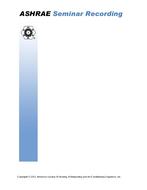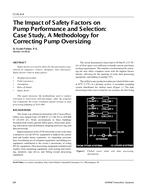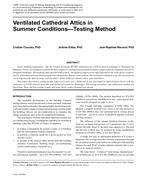A study was conducted in 77 schools that were experiencing mold contamination due to elevated levels of relative humidity. Temperatures and relative humidity were logged for a one week period at ten locations in each building. Occupants were interviewed to evaluate subjective determinations of temperature and humidity problems. The HVAC equipment was inspected and its conditions and operating parameters were documented. In each building, the causes of the high relative humidity were determined and corrective action was taken.
Several lessons were learned from this study. The causes of high relative humidity in air conditioned buildings have been defined and documented. Typically, high humidity was found to be caused by excessive ventilation air, oversized equipment, overwarm coils, and improper operation of HVAC equipment under part-load conditions. Less obvious causes, such as modulating chilled water valves, negative pressure, envelope problems, and improperly mixed outside air, were also found. Practical field measuring and surveying methods have been developed to evaluate HVAC equipment for these problems. Careful analysis of temperature and relative humidity logs was found to be a powerful and practical diagnostic tool. The physical symptoms of mold contamination caused by high humidity have been determined. In many instances these symptoms can be diagnostic of high humidity during a walk-around evaluation before measurements are even taken. Interestingly, building occupants were found to be very tolerant of high humidity levels. Complaints were registered only when there were other indoor air quality problems such as musty odors or there was visible mold present.
Presented at Thermal Performance of Exterior Envelopes of Whole Buildings X – December 2007
Citation: Thermal Performance of Exterior Envelopes of Whole Buildings X
Product Details
- Published:
- 2008
- Number of Pages:
- 10
- File Size:
- 1 file , 1.5 MB
- Product Code(s):
- D-BldgsX10


